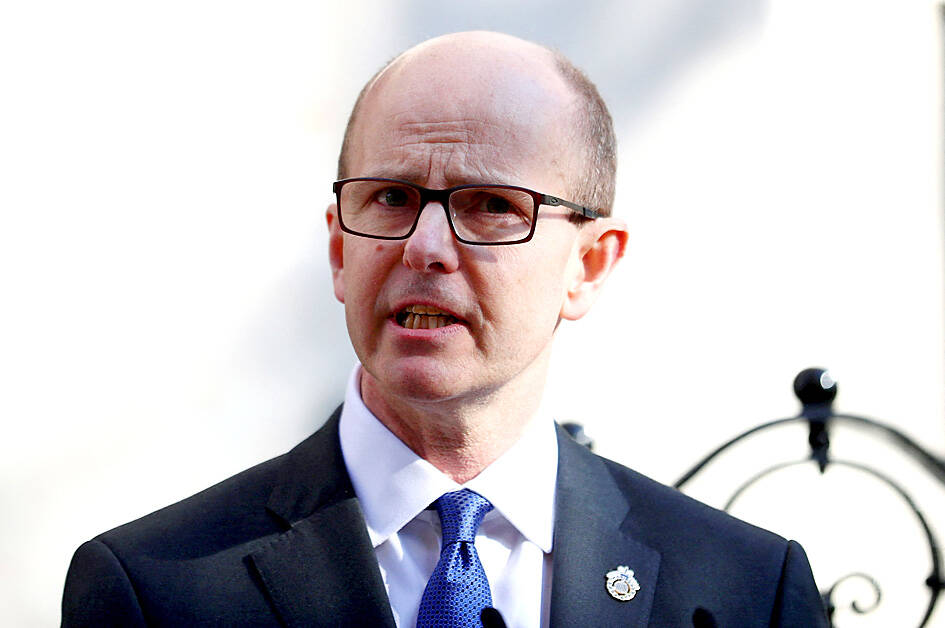Britain’s GCHQ spy agency chief yesterday was to warn Western nations of the “huge threat” from China seeking to exploit its technological dominance to control its own citizens and gain influence abroad.
GCHQ Director Jeremy Fleming was to tell a British defense studies body that the Chinese Communist Party views technologies such as satellite systems and digital currencies as a “tool to gain advantage.”
In excerpts of his speech released late on Monday, Fleming would use the annual “security lecture” at the RUSI think tank to argue that China could act in ways representing “a huge threat to us all.”

Photo: Reuters
He was to urge the UK and its allies to respond urgently.
“At GCHQ it is our privilege and duty to see the sliding door moments of history. This feels like one of those moments,” Fleming was to say. “Our future strategic technology advantage rests on what we as a community do next. I’m confident that together we can tilt that in our collective favour.”
Fleming has headed GCHQ since 2017, and has sought to bring the intelligence and security agency out of the shadows.
His comments came as China was in the process of launching its “digital yuan,” raising fears that authoritarian nations could use digital currencies to increase surveillance and control.
A centralized digital currency could “enable China to partially evade the sort of international sanctions currently being applied to [Russian President Vladimir] Putin’s regime in Russia,” Fleming was to say.
China has also launched a satellite navigation system, Beidou, as a rival to GPS, compelling Chinese to use it, Fleming was to say.
“Many believe that China is building a powerful anti-satellite capability, with a doctrine of denying other nations access to space in the event of a conflict,” he was to say. “And there are fears the technology could be used to track individuals.”
He was to accuse China of seeking to gain “control of the markets,” as well as “those in their sphere of influence and of their own citizens.”
Fleming was also to blame Beijing for creating “client economies and governments” by exporting technology to nations which risk “mortgaging the future” by buying in Chinese technology with “hidden costs.”

Indonesia was to sign an agreement to repatriate two British nationals, including a grandmother languishing on death row for drug-related crimes, an Indonesian government source said yesterday. “The practical arrangement will be signed today. The transfer will be done immediately after the technical side of the transfer is agreed,” the source said, identifying Lindsay Sandiford and 35-year-old Shahab Shahabadi as the people being transferred. Sandiford, a grandmother, was sentenced to death on the island of Bali in 2013 after she was convicted of trafficking drugs. Customs officers found cocaine worth an estimated US$2.14 million hidden in a false bottom in Sandiford’s suitcase when

CAUSE UNKNOWN: Weather and runway conditions were suitable for flight operations at the time of the accident, and no distress signal was sent, authorities said A cargo aircraft skidded off the runway into the sea at Hong Kong International Airport early yesterday, killing two ground crew in a patrol car, in one of the worst accidents in the airport’s 27-year history. The incident occurred at about 3:50am, when the plane is suspected to have lost control upon landing, veering off the runway and crashing through a fence, the Airport Authority Hong Kong said. The jet hit a security patrol car on the perimeter road outside the runway zone, which then fell into the water, it said in a statement. The four crew members on the plane, which

Japan’s ruling Liberal Democratic Party (LDP) and its junior partner yesterday signed a coalition deal, paving the way for Sanae Takaichi to become the nation’s first female prime minister. The 11th-hour agreement with the Japan Innovation Party (JIP) came just a day before the lower house was due to vote on Takaichi’s appointment as the fifth prime minister in as many years. If she wins, she will take office the same day. “I’m very much looking forward to working with you on efforts to make Japan’s economy stronger, and to reshape Japan as a country that can be responsible for future generations,”

SEVEN-MINUTE HEIST: The masked thieves stole nine pieces of 19th-century jewelry, including a crown, which they dropped and damaged as they made their escape The hunt was on yesterday for the band of thieves who stole eight priceless royal pieces of jewelry from the Louvre Museum in the heart of Paris in broad daylight. Officials said a team of 60 investigators was working on the theory that the raid was planned and executed by an organized crime group. The heist reignited a row over a lack of security in France’s museums, with French Minister of Justice yesterday admitting to security flaws in protecting the Louvre. “What is certain is that we have failed, since people were able to park a furniture hoist in the middle of